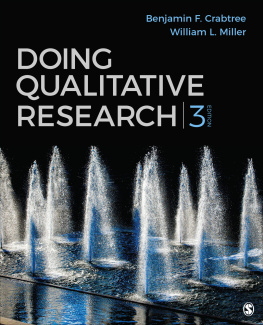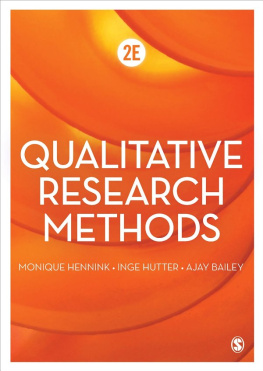The Practice of Qualitative Research
Third Edition
This book is dedicated to my mother, Helene Stockert.
Her remarkable spirit, wisdom, and love have been invaluable to me
throughout my academic career.
SAGE was founded in 1965 by Sara Miller McCune to support the dissemination of usable knowledge by publishing innovative and high-quality research and teaching content. Today, we publish over 900 journals, including those of more than 400 learned societies, more than 800 new books per year, and a growing range of library products including archives, data, case studies, reports, and video. SAGE remains majority-owned by our founder, and after Saras lifetime will become owned by a charitable trust that secures our continued independence.
Los Angeles | London | New Delhi | Singapore | Washington DC | Melbourne
The Practice of Qualitative Research
Engaging Students in the Research Process
Third Edition
- Sharlene Nagy Hesse-Biber
- Boston College

- Los Angeles
- London
- New Delhi
- Singapore
- Washington DC
- Melbourne
Copyright 2017 by SAGE Publications, Inc.
All rights reserved. No part of this book may be reproduced or utilized in any form or by any means, electronic or mechanical, including photocopying, recording, or by any information storage and retrieval system, without permission in writing from the publisher.
FOR INFORMATION:
SAGE Publications, Inc.
2455 Teller Road
Thousand Oaks, California 91320
E-mail: order@sagepub.com
SAGE Publications Ltd.
1 Oliver's Yard
55 City Road
London, EC1Y 1SP
United Kingdom
SAGE Publications India Pvt. Ltd.
B 1/I 1 Mohan Cooperative Industrial Area
Mathura Road, New Delhi 110 044
India
SAGE Publications Asia-Pacific Pte. Ltd.
3 Church Street
#10-04 Samsung Hub
Singapore 049483
Acquisitions Editor: Helen Salmon
eLearning Editor: Katie Ancheta
Editorial Assistant: Anna Villarruel
Production Editor: Jane Haenel
Copy Editor: Mark Bast
Typesetter: Hurix Prepress Systems (P) Ltd.
Proofreader: Tricia Currie-Knight
Indexer: Terri Morrissey
Cover Designer: Karine Hovsepian
Marketing Manager: Susannah Goldes
Printed in the United States of America
Library of Congress Cataloging-in-Publication Data
Names: Hesse-Biber, Sharlene Nagy, author.
Title: The practice of qualitative research : engaging students in the research process / Sharlene Hesse-Biber.
Description: 3rd edition. | Thousand Oaks, California : SAGE, [2017] |Includes bibliographical references and index.
Identifiers: LCCN 2015038939 | ISBN 9781452268088 (pbk. : alk. paper)
Subjects: LCSH: Social sciencesResearch. | Qualitative research.
Classification: LCC H62Self-esteem and rates of binge-eating disordersH478 2017 | DDC 001.4/2 dc23 LC record available at http://lccn.loc.gov/2015038939
This book is printed on acid-free paper.
16 17 18 19 20 10 9 8 7 6 5 4 3 2 1
Brief Contents
Preface
The third edition of The Practice of Qualitative Research continues to be committed to providing students and teachers with a practice model of qualitative approaches to research. Differing from other qualitative methods texts, it provides a problem-centric approach to engaging with qualitative research by linking the practice of any research method to specific research questions. Underscored is the importance of having a tight fit between the specific research question and the method or set of methods selected to answer a given research problem. Engaging with a qualitative approach to research that often calls for understanding the lived experiences of research participants requires a range of listening and reflexive skills that calls on the researcher, who is the data collector, to be reflective about the values and agendas he or she may bring into any given research endeavor. To practice research reflexively means to be aware of your own researcher standpoint, that is the set of values and attitudes you bring to any given research project, as well as an examination of those philosophical assumptions you have about the nature of the social world.
The third edition, while remaining true to these goals, also integrates the most current scholarly work in the area of qualitative approaches to research and integrates the use of online methods and computer-assisted qualitative data analysis software that can offer students new ways of collecting and analyzing data that allow for the asking of and addressing new questions.
The third edition continues to add to the pedagogical lessons garnered from the collective wisdom and feedback of the students and instructors who have used this book along with those insights I have gained in the teaching of qualitative research during the course of my teaching career.
Major Themes and New Features
Creating a Pedagogy of Engagement
My pedagogical experience in the research methods classroom has been that students need to be engaged with the learning of research methods. It is critical to provide them with a range of hands-on activities that allow them to take learning risks and to apply the more abstract ideas they have learned in the classroom setting in a more formal way. The in-classroom mini exercises in each chapter allow instructors to go back and forth with their students while engaging them in reflexive learning through small-group exercise engagements. Students then conduct their own small research projects as a way for them to put together the strands of their learning. Toward that end, the third edition contains a step-by-step process of engagement to offer guidance for students carrying out their research projects using a range of research methods. There is also a chapter devoted to writing up an entire research project in a step-by-step format that offers students a general research methods project template to guide them through the research project as a whole.
I have observed how critical it is for students to share what they have found difficult in the application of concepts to their own research activities. The in-class mini exercises serve to solidify a students knowledge and skills regarding a specific method. Each chapter also contains a set of discussion questions that serve to engage students and their peers in the nitty-gritty of issues involved in the practice of a particular method. Instructors and students also have access to methods-specific websites listed at the end of each chapter with an annotated description of each website for further enrichment.
All pedagogical features contained in the book are aimed at engaging students in a dialogue aimed to place them in a dynamic communication process whose goal is to challenge their preconceived ideas about how knowledge is built. Creating a dialogue among students involves asking them to interrogate their ideas by tracing their reasoning behind a given perspective or conclusion they reach as they go about learning and practicing new research methods skills. In addition, dialogue encourages students to work together by deeply listening to each others points of view and to explore and engage with the course material as a whole.
A Practice Model
The third edition continues to provide a









